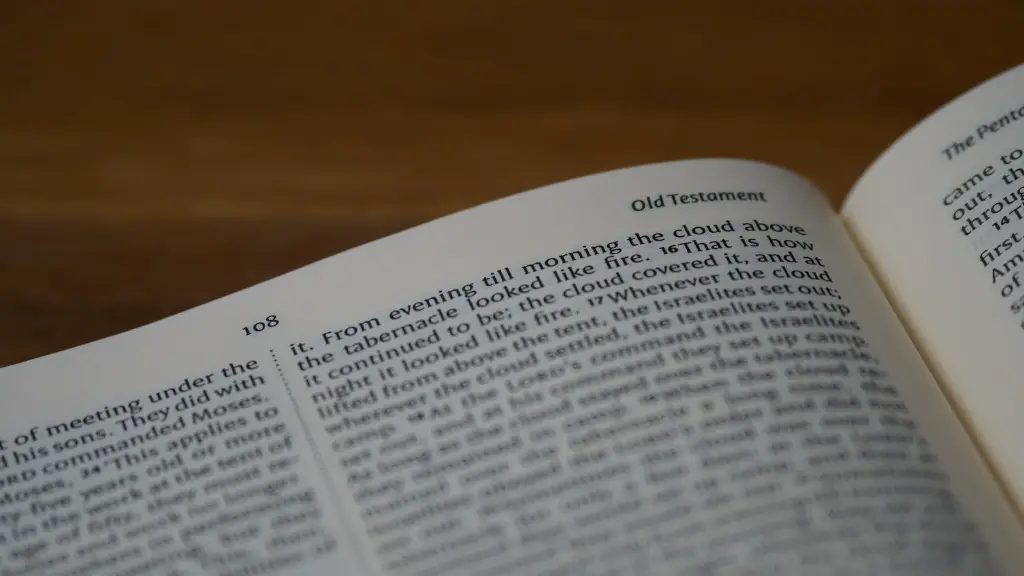The Rejection of Thecla
While Thecla is a prominent figure in early Christian literature, and was even venerated as a saint in some Christian traditions, and though throughout the centuries the cult of Thecla has been immensely popular, it is perhaps strange to note that she is absent from the biblical accounts of early Christianity. This article will delve into why this is, by examining her story and contrasting it with accepted biblical teaching.
Thecla is first mentioned in the Acts of Paul and Thecla, an apocryphal text written in the second century. The Acts tell us that Thecla was a wealthy and beautiful young woman who had been betrothed to Thamyris, a nobleman. But after hearing Paul preach in Iconium, she was so inspired by his message that she chose to repudiate her engagement and dedicate her life to God.
Thecla then famously fled the city, where she was persecuted and enslaved for her faith. Throughout these tribulations, she remained steadfast and eventually emerged unscathed. She eventually became a great leader and missionary, converting countless souls to Christianity on her travels.
The omission of Thecla from the Bible can be attributed to various reasons. One of the main reasons is that by the time the Acts of Paul and Thecla was written, the Church had become more organized, and more stringent rules had been set for the selection for the books of the Bible. The Acts of Paul and Thecla does not meet these criteria, as it presents an account that contradicts the accepted views of early church leaders.
In particular, the book highlights the fact that Thecla chose to repudiate her engagement rather than submit to it. This notion contradicted the teachings of the Apostles, who held that women should remain in submission to their husbands, while men should remain in submission to God. As such, the book was deemed heretical, and Thecla’s story was eventually excluded from the Bible.
Another pertinent reason for Thecla’s exclusion from the Bible is the presence of anachronisms and discrepancies within the Acts of Paul and Thecla. For example, the author includes a story which makes reference to the miracle at the River Jordan, though this miracle occurred centuries later. This suggests that the author was attempting to incorporate events from future centuries in order to strengthen Thecla’s role.
Finally, Thecla’s exclusion may also be because of her elevated status within the text. Though some scholars view Thecla as an example of a righteous Christian woman, others note that she is presented as a quasi-divine figure, with divine powers and abilities. This would also have been unacceptable to the early church authorities.
A Heroine of the Faith
Despite the fact that she is absent from the Bible, Thecla has been an important figure in the Christian tradition. In the early centuries of the faith, the cult of Thecla was immensely popular, and her feast day was celebrated throughout the Christian world. Churches, monasteries and other institutions were dedicated to Thecla, and she was also popularly venerated as a saint.
Later, during the Middle Ages and Renaissance, Thecla’s story was embraced by various artistic and literary traditions. One example of this is the medieval play The Repentance of Thecla by the Abbot of Marmoutier, which recounts the saint’s tribulations and path to God. Even today, Thecla’s story continues to inspire, acting as a powerful example of faith and courage.
Thecla’s legacy also speaks to wider issues within the Christian tradition. One of these is the fact that despite her absence from the biblical record, she has been greatly honored and revered by the faith. This illustrates that while biblical teaching is important, it is not the only source of knowledge and truth.
Thecla’s story also highlights the, at times, difficult relationship between Christianity and gender. Despite her example of courage and devotion, she was eventually omitted from the Bible. This suggests that patriarchy was a dominant force within the early Church, and that the inclusion of the story of a strong woman, who turns her back on the life dictated by society, was not accepted.
The Impact of Thecla
Though absent from the biblical record, Thecla has been a powerful figure in early Christianity. Through her example, she has inspired countless souls to persevere in their faith, and to act as a witness to the gospel of Jesus. Her legacy speaks to the enduring power of the Christian tradition, and the potential that even a single person can have upon it.
Thecla has also had a marked effect upon the history of the Church. Her story, while perhaps heretical in its own way, highlights issues within Christianity, such as the relationship between religion and gender and the power of tradition. In this way, Thecla can be seen as a precursor to later movements within Christianity, such as feminism and liberation theology.
Ultimately, though her story has been omitted from the Bible, Thecla remains an invaluable figure in the Christian tradition. Such figures remind us that Christianity is not stagnant and unchanging; it is an ever-evolving faith, ever changing and adapting to the needs of its adherents. As such, the story of Thecla should always continue to be remembered and celebrated.
The Performance of Thecla
Later renderings of Thecla’s story resonated with the faithful, as they were brought to life through different media and performances. Representations of Thecla started to gain in popularity in the Middle Ages when miracle plays were written about her where audiences were able to witness her bravery and courage. Notable miracle plays that were created were the “Santa Cause Thecla” written by Gautier de Coinci, and the “Vita Thecla” screenplay created by Liber diaboli. In these miracle plays, viewers were able to witness the heroic acts that Thecla committed and be immersed in the stories.
In the Renaissance, theatres started to gain traction and scholars took to signifying Thecla as a strong and fierce woman. In the mid-1500s, Melchiorre Brosi wrote a play about Thecla called “La Conversione di Santa Tecla”, detailing her conversions and her relationships with different characters in her life. In the play, Thecla became a symbol of strength, but also possessed a feminine charm. This representation of Thecla as a strong but charming woman was also found during the Counter-Reformation period, during which Thecla’s Story was featured as part of religious theatre.
European artists also took to painting and sculpting Thecla’s image throughout the post-Reformation era. Iconography of Thecla showed her with animals and flames surrounding her to epitomize her inner strength. One example of Thecla’s iconography was found at the altar in the chapel dedicated to Thecla at the Convent of Sant’Anna in Florence. This altarpiece featured lap dishes that depicted Thecla as a divine being surrounded with fire.
The Exclusion of Thecla
Despite a prevailing positive reception of Thecla, her story is not included in the Bible, leaving scholars and theologians to ponder why her account is absent. One possible reason is that those who formulated the New Testament may have viewed Thecla’s story as a potential challenge to their idea of the male-dominated Church. Thecla existed in a society controlled by men, yet she chose her faith and her ideals over her family, her natural roles, and her societal expectations. This notion may have been too confrontational for those who were attempting to establish a unified Christian Church.
Another possible reason for the exclusion of Thecla’s story is because her account was overshadowed by the other New Testament Saints. Saints Peter and Paul are heavily emphasized, and Thecla’s story may have been viewed as taking away from their roles. Additionally, the Acts of Paul and Thecla are more fantastical than many of the other texts in the New Testament, featuring themes such as miraculous escapes from wild beasts and magical resurrections that would have been hard for the Church Fathers to swallow.
It is difficult to pinpoint the exact reason for Thecla’s exclusion from the Bible. What is clear, however, is that Thecla emerged as a powerful female figure and a symbol of strength and resolve, who was manifested through folk tales and miracle plays, painting and sculpture, and later venerated as a saint. Thecla’s story should be remembered and embraced, even as a separate figure of strength.
The Multifaceted Legacy of Thecla
This article has examined the life and legacy of Thecla, who has been venerated as a saint in some Christian traditions and whose story is absent from the Biblical record. Despite this, the cult of Thecla has been immensely popular, and her story is highly influential in the Christian tradition.
Thecla’s story highlights crucial issues such as the relationship between Christianity and gender and the power of tradition. It also speaks to wider religious issues such as the importance of biblical teaching, and that Christianity should never be viewed as static and unchanging. As such, Thecla’s story should be embraced and remembered, and her legacy deeply respected.
The Meaning of Thecla
Though absent from the biblical account, Thecla is an important figure within the Christian tradition. Her example should be heeded and admired, as it speaks to the idea that faith is an ongoing journey, in which everyone has the potential to profoundly affect the growth and development of the faith. In this way, Thecla’s story should always be revered and remembered.
Thecla also invites us to consider the role of gender within Christianity. While patriarchy was a predominant feature of the early Church, Thecla’s story highlights the potential of strong women to challenge accepted ideas. In this way, Thecla can be seen as a precursor to later movements within Christianity, such as feminism and liberation theology.
Finally, the legacy of Thecla also serves to remind us that despite her absence from the Bible, she is still held in great esteem. Her story is an example of faith and courage, and an illustration of the power of perseverance, even in the face of adversity. Thecla’s life should always be remembered and celebrated.





